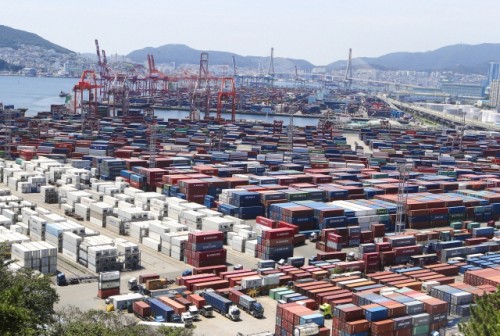 |
| /Source: Yonhap |
South Korea posted a current account surplus of over $9 billion in March, marking the 23rd consecutive month in the black. The strong performance was driven by increased exports of semiconductors and computer peripherals, while the end of the peak outbound travel season helped narrow the travel-related deficit.
According to the Bank of Korea’s preliminary balance of payments data released on May 9, the country recorded a current account surplus of $9.14 billion in March, up 27.3% from the previous month and 30.8% from the same period last year ($6.99 billion). The cumulative current account surplus for the first quarter reached $19.26 billion, a 16.9% increase from a year earlier. Since May 2023, South Korea has maintained a surplus streak, marking the third-longest run since 2000.
The goods account, which accounts for the largest portion of the current account, posted a surplus of $8.49 billion—its 24th consecutive month in the black. Exports rose 2.2% year-on-year to $59.31 billion. Semiconductors saw a 11.6% rebound to $13.2 billion after just one month, while computer peripherals and pharmaceuticals grew by 31.7% and 17.6%, respectively. However, steel and petroleum product exports dropped by 4.9% and 28.2%.
Export growth continued in Southeast Asia (11.0%) and the Middle East (13.2%), with exports to Japan (1.9%) and the EU (9.8%) also turning positive.
Imports rose 2.3% to $50.82 billion. Although energy prices continued to decline, increased LNG import volume (up 11%) slowed the drop in raw material imports, which fell 7.5% to $23.85 billion. Capital goods imports rose 14.1% to $20.41 billion, and consumer goods climbed 7.1% to $9.04 billion, led by surges in semiconductor equipment (85.1%) and passenger cars (8.8%).
The services account recorded a $2.21 billion deficit, narrower than February’s $3.21 billion shortfall, thanks to the end of the winter travel boom and a pickup in inbound travel. The travel account deficit narrowed to $720 million in March from $1.45 billion in February.
The primary income account showed a surplus of $3.23 billion, mainly from dividends. Income from direct investment dividends reached $2.6 billion, and interest income totaled $800 million. The secondary income account posted a $370 million deficit.
In the financial account, net external assets rose by $7.82 billion in March, up 57.7% from the previous month. Korean overseas investments increased by $4.75 billion, and foreign investment in Korea rose by $760 million. Outbound securities investment jumped by $12.13 billion, mainly in stocks, while inbound investment increased by $4.5 billion, mostly in bonds. Derivatives rose $2.04 billion, other investments fell $3.26 billion, and reserve assets declined by $2.58 billion.
Most Read
-
1
-
2
-
3
-
4
-
5
-
6
-
7





















